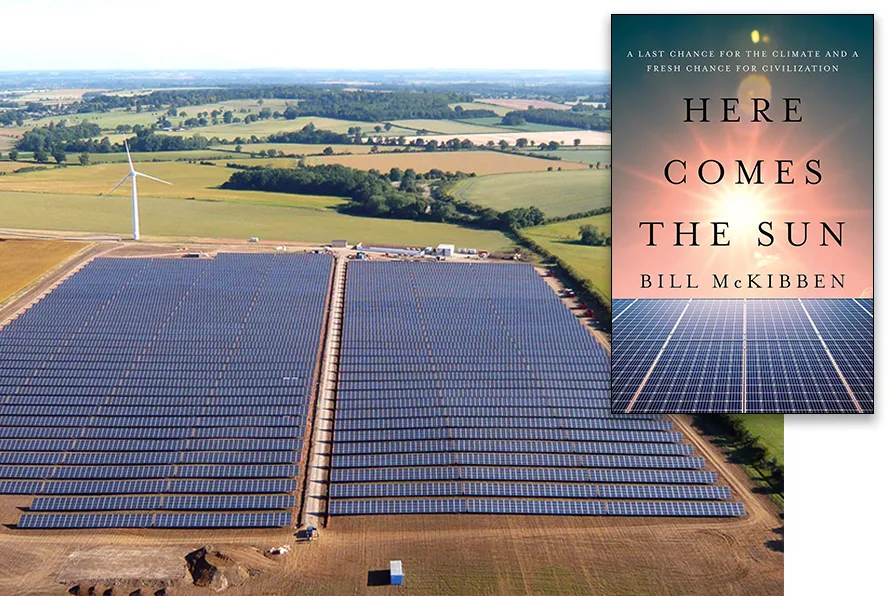New releases from Bill Callahan, The Delines, and Beck
MARTIN GRAHAM casts a critical eye over an informative study of the fact that solar power - universally available - is now cheaper than fossil fuels

 THE FUTURE: Westmill Solar Park in Oxfordshire, England, believed to be the largest community-owned photovoltaic power station in the world. [Pic: MrRenewables Westmill Solar Co-operative/Neil Maw/CC]
THE FUTURE: Westmill Solar Park in Oxfordshire, England, believed to be the largest community-owned photovoltaic power station in the world. [Pic: MrRenewables Westmill Solar Co-operative/Neil Maw/CC]
Here Comes the Sun
Bill McKibben, W W Norton, £22
BILL McKIBBEN is a prominent American environmentalist, author, journalist and supporter of Bernie Sanders. Having written extensively since 1989 on the impact of global warming, his latest book is subtitled A Last Chance for the Climate and a Fresh Chance for Civilisation and makes an impassioned case for both.
What distinguishes this book from most previous ones on this topic is that the “last chance for the climate,” alluded to in the subtitle, is now, in the author’s view, within grasp. For the first time, the cost of generating electricity generated by solar PV has fallen below the cost of generating it by burning fossil fuels; and we can expect this cost to continue to fall, together with that of electricity from wind turbines and the cost of batteries and many electrical applications. The extraction, transportation and burning of fossil fuels, as mature industries, cannot enjoy similar efficiency gains.
Thus, at the eleventh hour, the prospect of avoiding mass extinction has opened up that doesn’t require, as did James Hanson’s proposal decades ago, an international carbon tax at a level sufficient to keep fossil fuels in the ground.
McKibbon acknowledges China’s immense contribution to these efficiency gains and, through its long-term planning, the industrial capacity to exploit them globally. China is currently building nearly two-thirds of the world’s wind and solar projects and selling them globally — except, of course, to the USA which has chosen to hide behind tariff barriers while continuing to export its especially climate-destructive fossil fuels.
According to the International Energy Agency, China’s technology exports by 2035 are expected to exceed the combined oil exports of Saudi Arabia and the United Arab Emirates. China truly is, in the author’s words, “the Saudi Arabia of sun.”
McKibbon’s appreciation of both continuing efficiencies and China’s role are well founded, but is his faith that they will provide a Last Chance for the Climate justified? Let’s hope so, but there are two areas of concern.
First, the growth in the global supply of solar and wind-generated electricity must significantly exceed the growth in the global demand for electricity. McKibbon thinks this can be done provided we campaign for public ownership, oppose the lobbying power of the fossil fuel industry, oppose governments wasting money on such distractions as carbon capture and nuclear power and, while avoiding trampling on the rights of indigenous people, overcome nimby opposition to wind farms and large solar arrays. But even if these campaigns succeed, will they be sufficient?
The second area of concern is that, while most of the world does not enjoy a reliable national grid, and would benefit, both economically and democratically, from decentralised solar power, electricity is already supplied in advanced capitalist economies, ie those responsible for most global warming, by a national grid. The price of electricity supplied in this way is set by governments or their delegated regulators. A unit of electricity supplied in this way is not a “commodity” in the usual, Marxist sense. Suppliers must be offered sufficient profit to induce them to supply the grid, and it is this, not cheapness of supply, that is the determining factor. McKibbon’s call for “public ownership” could address this, but does it go far enough?
Both concerns arise because capitalism is a system for accumulating capital, not workers’ welfare. If burning fossil fuel enables capital to be accumulated, it will continue. Furthermore, as some of the gas and oil reserves have a very low marginal cost, burning them will remain profitable for many years. Exploiting these reserves could be enough to cause climate collapse, following which the owners of capital, or at least the oligarchs who own or control most of it, have the option of retiring to their bunkers and mountaintop retreats. The rest of us do not.
As for the “fresh chance for civilisation” in the subtitle, this reflects the author’s optimistic view of a world in which all energy is provided by solar arrays and wind turbines. Unlike deposits of oil, gas and coal, solar and wind power are globally available. While he accepts that solar and wind power won’t, by themselves, liberate us from inequality and exploitation and undermine authoritarian states, he thinks it will contribute to a more egalitarian society and elimination of economic rents associated with the sale of much fossil fuel.
In a speech in 1920, Lenin defined communism as “soviet power plus electrification.” In the second decade of the 21st century, perhaps it’s time to update this definition to “workers’ power plus de-carbonised electrification”. The question raised by this book is whether communism, so redefined, is a requirement for avoiding climate collapse or something that could emerge following de-carbonised electrification.
A critical reading of this well-researched and informative book will help you reach your own conclusion.









